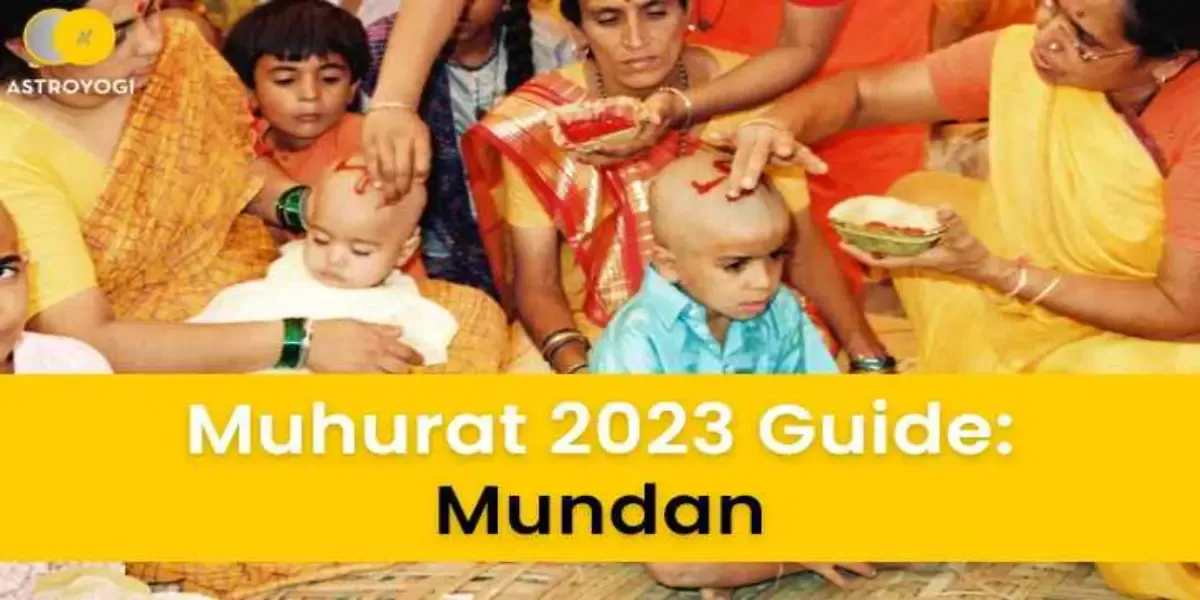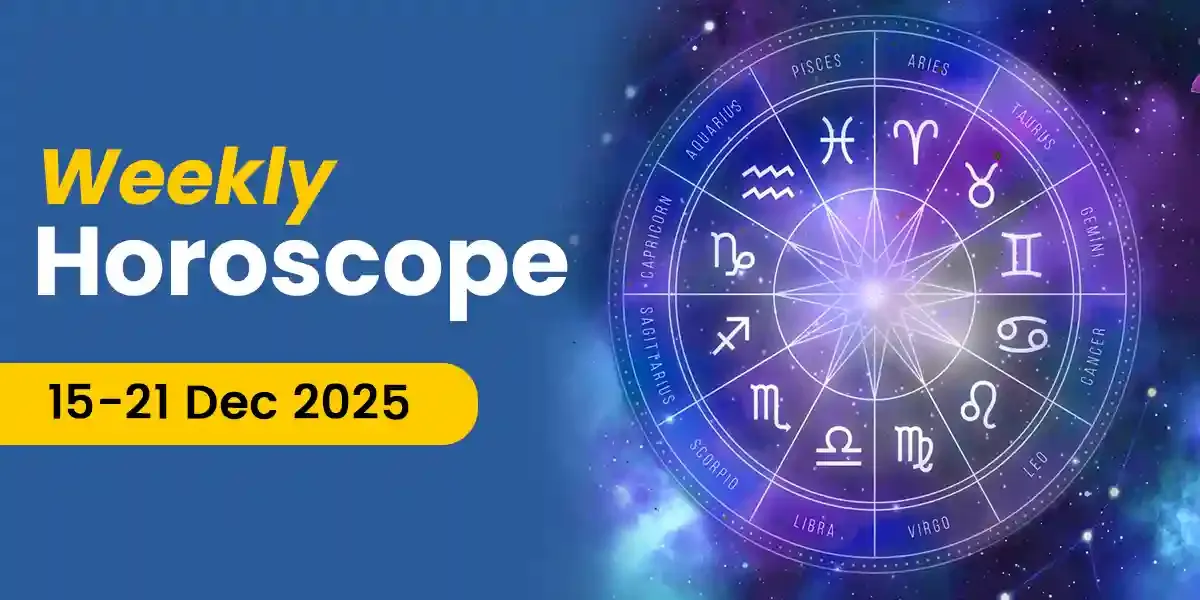
- Planning for your kid’s Mundan?
- Looking for an auspicious day for Mundan in 2023?
- Wondering why Mundan is important for your baby?
- How does Mundan help your child?
- How to conduct a Mundan for your child?
If you have questions about Mundan, the holy ceremony that marks the beginning of a new chapter in a child's life, then this blog is for you.
So keep reading to avoid missing any crucial information!
In Hinduism, there are sixteen sacraments, or Solah Sanskars, in a person's life, from birth to death. The sixteen rites include marriage, Namkaran, Annaprashan, etc., and Mundan is one of them. The Mundan Sanskar is one of the 16 purification rites known as Shodasha Samskara in the Hindu tradition, which is performed in childhood and is required of all children. The Mundan ceremony is thought to bestow prosperity, happiness, and good luck on the child. This unique ceremony is not only religious in nature, but it also has scientific significance.
So, if you are interested in learning more about Mundan Sanskar, this blog will give you some invaluable information on this sacred Hindu ritual followed by every family!
When is Mundan Performed?
The Mundan ceremony is carried out after a child is born, which involves shaving off the baby's first hair or the birth hair. It is intended to improve the child’s well-being, good fortune, and prosperity.
What Are The Benefits of A Mundan Ceremony?
Every Hindu rite has a special meaning, and the Mundan is no exception. Discover how Mundan Sanskar can be beneficial to your child.
- Fosters the child’s mental and spiritual growth while cleansing them of any negativity from their previous life.
- It shields the child from the evil eye.
- Shaving a baby's birth hair also releases them from the Karma of their previous life.
- When the child's head is shaved, the energies in the body rush to the head. Shaving or performing a Mundan on a child's hair is equivalent to pruning a tree. This results in a more peaceful mind, and one will notice a significant shift in their mental state.
- Promotes healthy hair growth.
- According to the Yajurveda, Mundan is a crucial ritual for improving the child’s health, building one's strength, and purifying the child’s body after birth. As a result, when the baby's hair is shaved, it should be done according to custom, and proper arrangements for the ceremony should be made.
- Shaving the hair keeps the child's head cool and prevents irritation, especially during the hot summer months. As a result, the child's body temperature remains normal.
- It is performed with the intention of purifying and cleansing the child’s body and soul. The Mundan also clears negative energies.
- After the Mundan ceremony, the child is no longer bothered much by teething pain.
- When a child's birth hair is shaved, more sunlight can quickly reach the head. As Vitamin D improves blood circulation in the scalp, it aids in hair growth.
- Having the Mundan performed can enhance the child's mental capacity, physical strength, educational development, and academic progress. Additionally, it ensures that the child won't experience any health problems.
- The ritual also teaches the children the value of cleanliness.
Simply put, having the Mundan rite performed ensures that the child will live a happy and harmonious life. The ceremony bestows a long life and a prosperous future for the child. People choose to perform the Mundan ceremony for their children because of its numerous benefits. Mundan Sanskar is considered one of the key ceremonies or rites of passage performed after the birth of a child, and it should only be performed at an auspicious time. This is where Shubh Muhurat has an essential role to play.
Let’s look at the Shubh Muhurat for the Mundan ceremony in 2023.
Have you checked this yet? 👉 Horoscope 2023 | Tarot 2023 | Numerology 2023
Mundan Muhurat 2023: Here's The Complete List!
It is crucial that the Mundan ceremony be performed on a Shubh Muhurat. Here is the list of Mundan Muhurat 2023, which includes the date, time, and Nakshatra for 2023 to aid you in making the best decision possible.
Shubh Muhurat for Mundan Ceremony in January 2023
- 23rd January 2023 (Monday), Muhurat- 07:17 AM to 07:17 AM, 24th January 2023, Nakshatra- Dhanishtha
- 27th January 2023 (Friday), Muhurta- 06:36 PM to 07:15 AM, 28th January 2023, Nakshatra- Ashwini
Shubh Muhurat for Mundan Ceremony in February 2023
- 3rd February 2023 (Friday), Muhurat- 06:18 AM to 06:58 PM, Nakshatra- Punarvasu
- 10th February 2023 (Tuesday), Muhurat- 07:58 AM to 07:06 AM, 11th February 2023, Nakshatra- Hasta
- 24th February 2023 (Tuesday), Muhurat- 03:44 AM to 12:31 PM, 25th February 2023 Nakshatra- Ashwini
Shubh Muhurat for Mundan Ceremony in March 2023
- 1st March 2023 (Wednesday), Muhurat- 06:50 AM to 09:42 AM, Nakshatra- Mrigashirsha
- 2nd March 2023 (Thursday), Muhurat - 12:43 PM to 07:55 PM, Nakshatra- Punarvasu
- 9th March 2023 (Thursday), Muhurat- 04:20 PM to 09:21 AM, 10th March 2023, Nakshatra- Hasta
- 18th March 2023 (Saturday), Muhurat - 02:46 AM to 06:31 AM, Nakshatra- Shravan
Shubh Muhurat for Mundan Ceremony in April 2023
- 14th April 2023 (Friday), Muhurat- 11:13 AM to 06:00 AM, 15th April 2023, Nakshatra- Shravan
- 24th April 2023 (Monday), Muhurat- 08:25 AM to 02:07 PM, 25th April 2023, Nakshatra- Mrigashirsha
- 26th April 2023 (Wednesday), Muhurat- 11:28 AM to 01:39 PM, 27th April 2023, Nakshatra- Punarvasu
Shubh Muhurat for Mundan Ceremony in May 2023
- 3rd May 2023 (Wednesday), Muhurat- 05:43 AM to 11:50 PM, Nakshatra- Hasta
- 8th May 2023 (Monday), Muhurat- 05:39 AM to 07:19 AM, Nakshatra- Jyeshtha
- 11th May 2023 (Thursday), Muhurat- 10:17 PM to 09:07 AM, 12th May 2023, Nakshatra- Shravana
- 17th May 2023 (Wednesday), Muhurat- 07:39 AM to 10:28 PM, Nakshatra- Ashwini
- 22nd May 2023 (Monday), Muhurat - 05:31 AM to 10:37 AM, Nakshatra- Mrigashirsha
- 24th May 2023 (Wednesday), Muhurat- 05:30 AM to 03:01 PM, 25th May 2023, Nakshatra- Punarvasu
- 30th May 2023 (Tuesday), Muhurat- 04:29 AM to 05:28 AM, Nakshatra- Hasta
Shubh Muhurat for Mundan Ceremony in June 2023
- 1st June 2023 (Thursday), Muhurat- 01:39 PM to 06:53 AM, 2nd June 2023, Nakshatra- Swati
- 7th June 2023 (Wednesday), Muhurat- 09:51 PM to 06:59 PM, 8th June 2023, Nakshatra- Shravan
- 10th June 2023 (Sunday), Muhurat- 03:09 AM to 05:26 AM, Nakshatra- Shatabhisha
- 14th June 2023 (Wednesday), Muhurat- 05:26 AM to 08:48 AM, Nakshatra- Ashwini
- 19th June 2023 (Monday), Muhurat- 08:10 PM to 05:27 AM, 20th June 2023, Nakshatra- Punarvasu
- 21st June 2023 (Wednesday), Muhurta - 05:27 AM to 03:10 PM, Nakshatra, Pushya
- 28th June 2023 (Wednesday), Muhurta - 05:29 AM to 03:19 PM, Nakshatra- Chitra
 What is the Religious and Scientific Significance of Mundan Sanskar?
What is the Religious and Scientific Significance of Mundan Sanskar?
In Hinduism, Mundan Sanskar has immense significance and importance. The Mundan ceremony is not a recent idea; it has existed in Indian culture for all of recorded history. In various cultures and regions of India, the Mundan ceremony is also referred to as Chaul Mundan, Chudakarana, Chura Karm, Jadula, and Chaul Karm Sanskar.
Vedic texts state that the child's hair is cut when they are born in order to pay off their debts from previous births and atone for all of their sins; this entire procedure is referred to as Mundan. It is commonly believed that when a baby is conceived, the effects of their previous births' bad as well as good deeds may be left on the strands of their hair. This is why it is important to follow local traditions when shaving a baby's head of hair and to make the necessary preparations for the ceremony. Apart from religious beliefs, science holds that while a baby is still inside their mother's womb, several harmful bacteria and germs get settled in its hair and remain there even after washing it. As a result, it is recommended that hair be shaved within a year of the baby's birth.
You may also like to read 👉 Looking for Love Life Guidance? Keep Calm and Read Love Horoscope Predictions for 2023!
Here is what a Muhurat is, in case you've been wondering.
The Muhurat or Muhurta is the opportune, auspicious, or favorable moment or period of time in Vedic astrology. It is commonly believed, particularly in Hinduism, that performing a task or work during a Shubh Muhurat increases the chances of success and yields fruitful results. As a result, it is critical to consider the Shubh Muhurat before undertaking any critical or demanding task or performing any auspicious function, such as the Mundan ceremony.
In Vedic Astrology, Shubh Muhurat is the precise moment when the Nakshatras (constellations) and the positions of the planets are deemed favorable for carrying out a particular task. This is why many people firmly believe that following the Muhurat will enable them to achieve more favorable results without running into any difficulties. According to Hindu tradition, the Mundan ceremony should take place on an auspicious date and time. This is where Astroyogi's Mundan Muhurat 2023 can be useful.
Also Read : A Recession in 2023 Is Likely! Plan Better with Business And Finance Horoscope 2023 Predictions!
How is Mundan Ritual Performed?
Every family conducts a Mundan ceremony according to its own traditions and customs. The Mundan ceremony is typically conducted as follows.
- The mother should sit with the child on her lap, facing the sacred fire's Western direction. The child’s face should also face West.
- A Homam or Havan should be performed by a priest.
- The mother should sit with the child on her lap, facing the sacred fire in the west. The baby's face should also be facing west.
- The priest must shave or cut a portion of the child's hair while chanting holy hymns. The barber then shaves off the rest of the hair. In many families, the child's father performs the first part of the ritual instead of the priest.
- The child's shaved head is washed with the holy water from the river Ganges. After this, sandalwood and turmeric paste is applied to their head. This is beneficial in healing any cuts or nicks on the head. The mixture also has a cooling effect on the head.
- The shaved hair is offered to a sacred river like the Ganges or offered to a divine deity.
- After shaving, the priest and the barber are given donations and food.
- In some cultures, a tuft of hair is left on the child's head. The tuft of hair is known as 'Shikha,' 'Bodi,' or 'Choti.'
When Should The Mundan Be Performed?
- Make sure the Muhurat always falls on a Monday, Wednesday, Thursday, or Friday because these days are considered favorable for the ceremony.
- When it comes to Tithi, the ceremony should take place on Dwitiya, Tritiya, Panchami, Saptami, Dashami, Ekadashi, or Trayodashi.
- Some favorable Nakshatras for the ceremony include Jyestha, Pushya, Revathi, Punarvasu, Chitra, Mrigashira, Hasta, Ashwini, Shravana, Swati, Dhanishtha, and Shatabhisha.
- The Mundan should be performed before the Ashadhi Ekadashi in the Hindu calendar month of Ashadha. It should be performed in the months of Magh and Phalguna.
- The auspicious Lagna, such as Dwitiya, Tritiya, Chaturthi, Shashthi, Navami, and Dwadashi, is a great time for the ceremony.
Some Important ‘Don’ts’ of Mundan Muhurat
- Additionally, remember that the ceremony shouldn't be held in the Hindu months of Jyeshtha, Chaitra, or Vaishakha.
- Some scholars believe that the Mundan ceremony should be prohibited during a child's birth month or Nakshatra.
- In addition, it is considered inauspicious to perform the Mundan ceremony when the Moon is in the 4th, 8th, 12th, or house of opponents in the child’s horoscope.
However, it's best to consult with experienced and qualified astrologers as they will be able to provide you with the most accurate information on what day and time will be most suitable to perform the Mundan ceremony. When you consult a qualified astrologer, they can determine the ideal Muhurat for Mundan based on your child's birth chart or Kundli. The astrologer must consider various variables, including the Nakshatra, Vaar (day), Tithi (date), placement of the planets, etc., to determine the best Mundan Muhurat.
Our in-house team of writers comprises of vibrant, like-minded, and curious souls who are passionate about helping people find joy and motivation through the magic of words. Our writers are keen on using their skills to make the study of divination sciences a guiding tool in people's lives. They hold expertise in writing on a myriad of topics related to Indian Astrology, Spirituality, Planetary Movements, Vastu Shastra, Numerology, and Tarot among several others. The Astroyogi team aims to write articles that can help the readers lead a life of peace and tranquility whilst enjoying the many ups and downs of life!


































